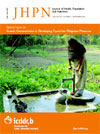
|
The Journal of Health, Population and Nutrition
icddr,b
ISSN: 1606-0997
EISSN: 1606-0997
Vol. 30, No. 2, 2012, pp. 159-171
|
 Bioline Code: hn12022
Bioline Code: hn12022
Full paper language: English
Document type: Research Article
Document available free of charge
|
|
|
The Journal of Health, Population and Nutrition, Vol. 30, No. 2, 2012, pp. 159-171
| en |
An Examination of Women Experiencing Obstetric Complications Requiring Emergency Care: Perceptions and Sociocultural Consequences of Caesarean Sections in Bangladesh
Khan, Rasheda; Blum, Lauren S.; Sultana, Marzia; Sayeda, Bilkis & Koblinsky, Marge
Abstract
Little is known about the physical and socioeconomic postpartum consequences of women who experience
obstetric complications and require emergency obstetric care (EmOC), particularly in resource-poor
countries such as Bangladesh where historically there has been a strong cultural preference for births at
home. Recent increases in the use of skilled birth attendants show socioeconomic disparities in access to
emergency obstetric services, highlighting the need to examine birthing preparation and perceptions of
EmOC, including caesarean sections. Twenty women who delivered at a hospital and were identified by
physicians as having severe obstetric complications during delivery or immediately thereafter were selected
to participate in this qualitative study. Purposive sampling was used for selecting the women. The study
was carried out in Matlab, Bangladesh, during March 2008 - August 2009. Data-collection methods included
in-depth interviews with women and, whenever possible, their family members. The results showed
that the women were poorly informed before delivery about pregnancy-related complications and medical
indications for emergency care. Barriers to care-seeking at emergency obstetric facilities and acceptance of
lifesaving care were related to apprehensions about the physical consequences and social stigma, resulting
from hospital procedures and financial concerns. The respondents held many misconceptions about
caesarean sections and distrust regarding the reason for recommending the procedure by the healthcare
providers. Women who had caesarean sections incurred high costs that led to economic burdens on family
members, and the blame was attributed to the woman. The postpartum health consequences reported by
the women were generally left untreated. The data underscore the importance of educating women and
their families about pregnancy-related complications and preparing families for the possibility of caesarean
section. At the same time, the health systems need to be strengthened to ensure that all women in clinical
need of lifesaving obstetric surgery access quality EmOC services rapidly and, once in a facility, can obtain
a caesarean section promptly, if needed. While greater access to surgical interventions may be lifesaving,
policy-makers need to institute mechanisms to discourage the over-medicalization of childbirth in a context
where the use of caesarean section is rapidly rising.
Keywords
Caesarean section; Childbirth; Economic burden; Obstetric complications; Perceptions; Qualitative studies; Bangladesh
|
| |
© Copyright 2012 - Journal of Health Population and Nutrition
Alternative site location: http://www.jhpn.net
|
|
